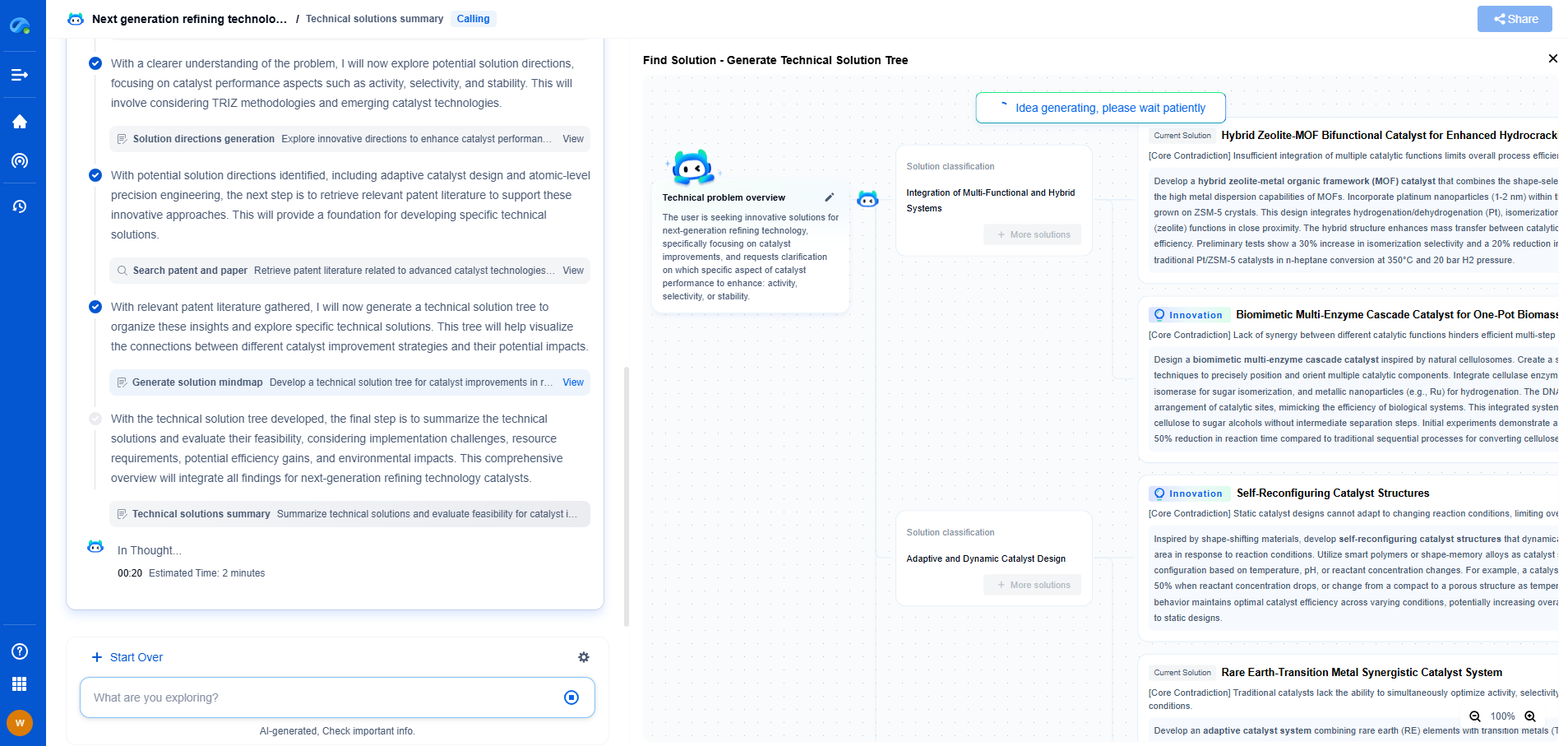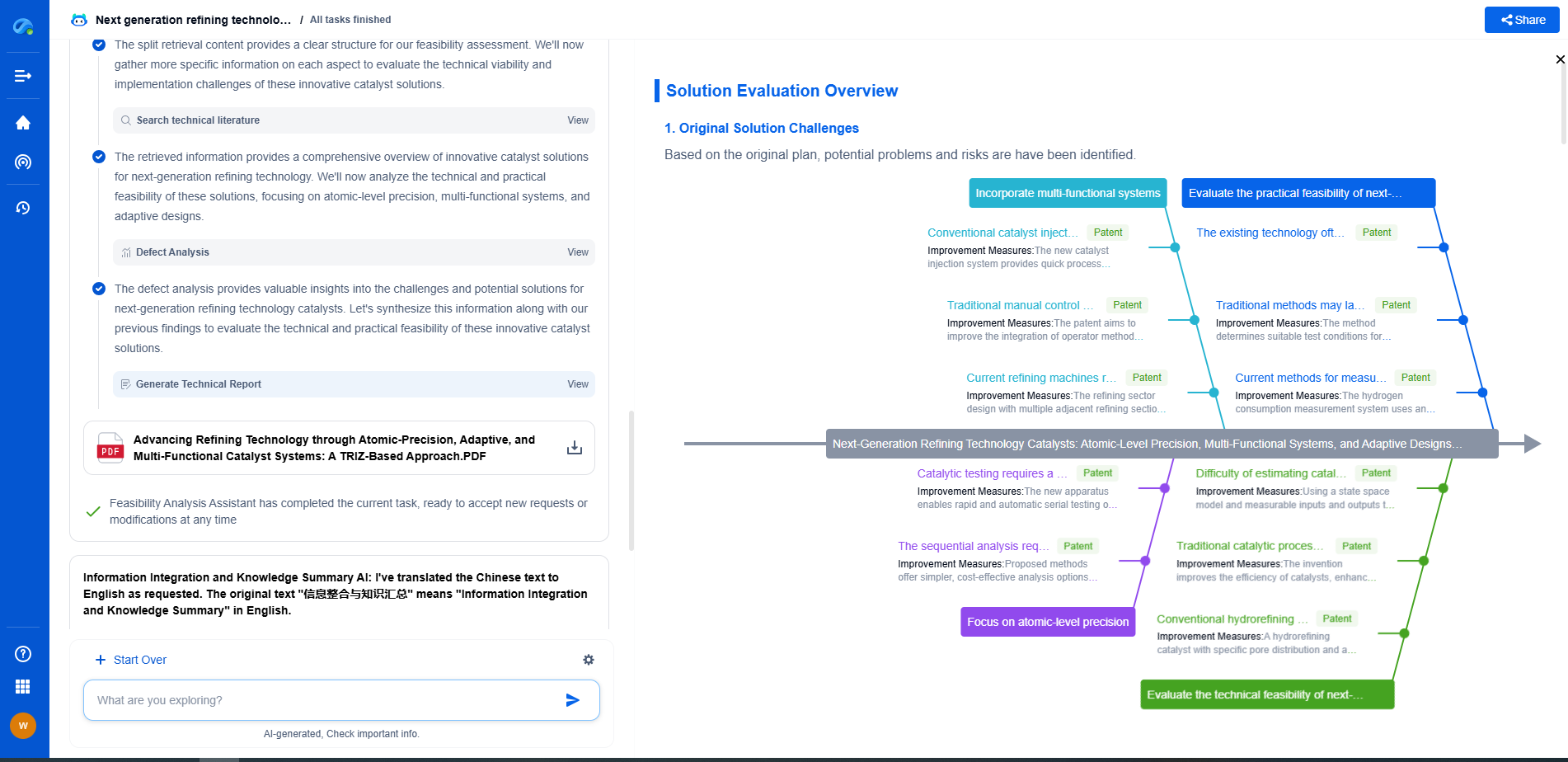Marine Power Systems: Challenges and Solutions for Ships
JUN 26, 2025 |
The Complexity of Marine Power Systems
Marine power systems are inherently complex due to the demanding environments in which they operate. They must withstand harsh conditions such as saltwater corrosion, extreme temperatures, and continuous vibrations. Furthermore, these systems are required to be highly reliable to ensure the safe transport of goods and passengers across the globe. Traditional power systems, primarily reliant on diesel engines, have been the backbone of maritime propulsion for decades, providing a robust and reliable power source. However, they are not without their challenges, particularly concerning environmental impact and fuel efficiency.
Environmental Challenges and Sustainability
One of the most pressing challenges facing marine power systems today is the need to reduce their environmental footprint. The International Maritime Organization (IMO) has set ambitious targets for reducing greenhouse gas emissions, compelling the industry to seek alternative solutions to conventional diesel engines. Shipping currently accounts for a significant portion of global emissions, and the pressure is mounting on shipowners and operators to adopt cleaner technologies.
Alternative Fuels and Electrification
In response to environmental regulations, there has been a growing interest in alternative fuels such as liquefied natural gas (LNG), hydrogen, and biofuels. LNG, for instance, offers a cleaner-burning option compared to traditional marine diesel, significantly reducing sulfur oxide and nitrogen oxide emissions. Hydrogen fuel cells are also being explored for their potential to provide zero-emission power. These alternative fuels, however, require significant changes in infrastructure and technology, which can pose economic and logistical challenges.
Electrification is another promising avenue for reducing emissions in marine power systems. Hybrid and fully electric propulsion systems are gaining traction, particularly for short-distance and coastal shipping. These systems can offer substantial reductions in emissions and fuel consumption. However, the current limitations in battery technology, such as weight, capacity, and charging infrastructure, remain obstacles to widespread adoption.
Energy Efficiency and Technological Advancements
Improving energy efficiency is a key focus in the evolution of marine power systems. Technological advancements such as advanced hull designs, optimized propeller systems, and waste heat recovery systems are being implemented to enhance fuel efficiency and reduce emissions. Digitalization and real-time data analytics also play a vital role in improving operational efficiency. By leveraging data analytics, ship operators can optimize fuel consumption and engine performance, minimize downtime, and extend maintenance intervals.
Retrofitting Existing Fleets
For existing ships, retrofitting offers a practical solution for integrating new technologies into older vessels. Retrofitting can involve installing scrubbers to reduce sulfur emissions, upgrading propulsion systems, or incorporating energy-saving devices. While retrofitting presents a viable path to compliance with new regulations, it also challenges shipowners with financial and operational considerations. The cost of retrofitting must be weighed against the potential savings in fuel and operational efficiency.
Collaborative Efforts and Research
Addressing the challenges of marine power systems requires collaborative efforts among industry stakeholders, governments, and research institutions. Joint initiatives aimed at developing and testing new technologies are vital for accelerating innovation in the maritime sector. Research into advanced materials, alternative fuels, and energy storage solutions continues to push the boundaries of what is possible for future marine power systems.
Conclusion: Navigating Towards a Sustainable Future
The challenges facing marine power systems are multifaceted, encompassing environmental, technological, and economic aspects. However, the maritime industry is committed to navigating these challenges by embracing innovative solutions and fostering collaboration. The journey towards more sustainable marine power systems will require a combination of alternative fuels, electrification, and continuous advancements in technology. As the industry progresses, the integration of cleaner, more efficient power systems will be essential in ensuring a sustainable future for global shipping.
Stay Ahead in Power Systems Innovation
From intelligent microgrids and energy storage integration to dynamic load balancing and DC-DC converter optimization, the power supply systems domain is rapidly evolving to meet the demands of electrification, decarbonization, and energy resilience.
In such a high-stakes environment, how can your R&D and patent strategy keep up?
Patsnap Eureka, our intelligent AI assistant built for R&D professionals in high-tech sectors, empowers you with real-time expert-level analysis, technology roadmap exploration, and strategic mapping of core patents—all within a seamless, user-friendly interface.
👉 Experience how Patsnap Eureka can supercharge your workflow in power systems R&D and IP analysis. Request a live demo or start your trial today.
- R&D
- Intellectual Property
- Life Sciences
- Materials
- Tech Scout
- Unparalleled Data Quality
- Higher Quality Content
- 60% Fewer Hallucinations
Browse by: Latest US Patents, China's latest patents, Technical Efficacy Thesaurus, Application Domain, Technology Topic, Popular Technical Reports.
© 2025 PatSnap. All rights reserved.Legal|Privacy policy|Modern Slavery Act Transparency Statement|Sitemap|About US| Contact US: help@patsnap.com

